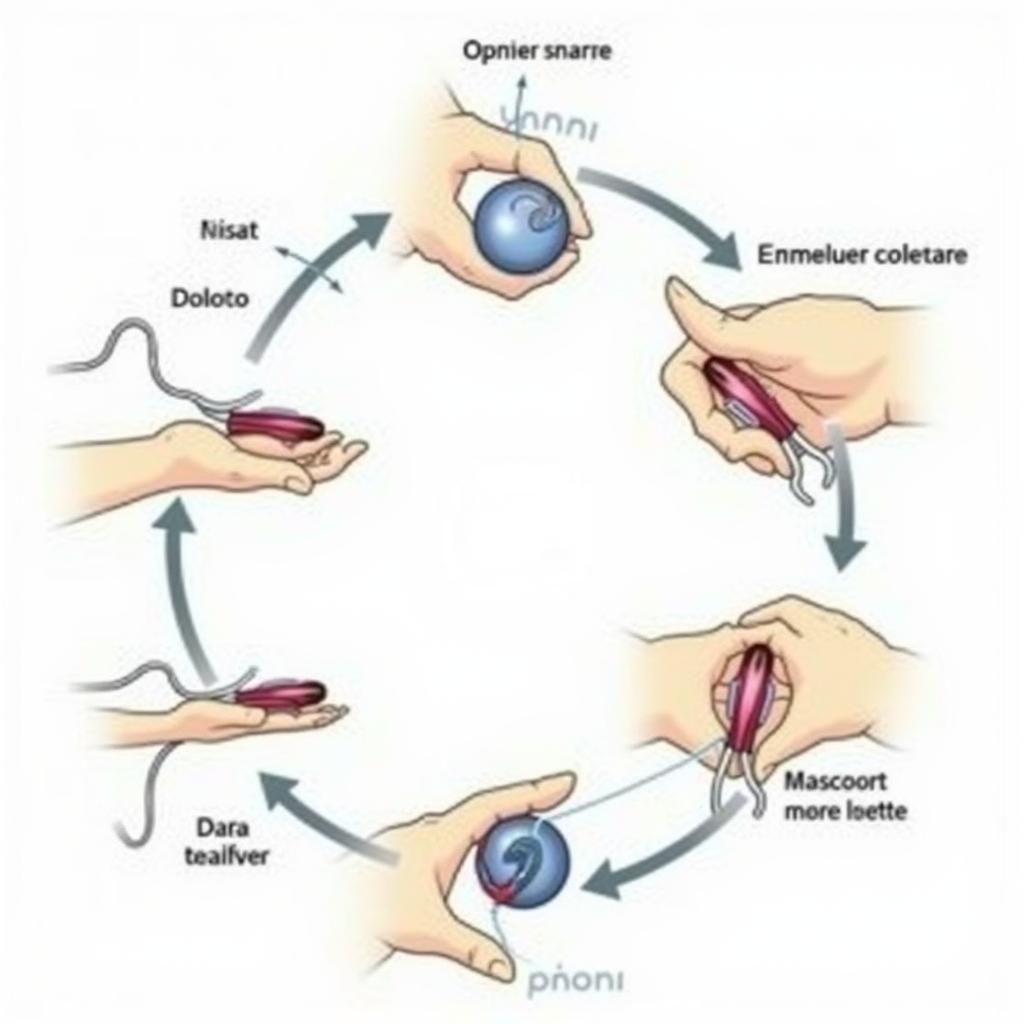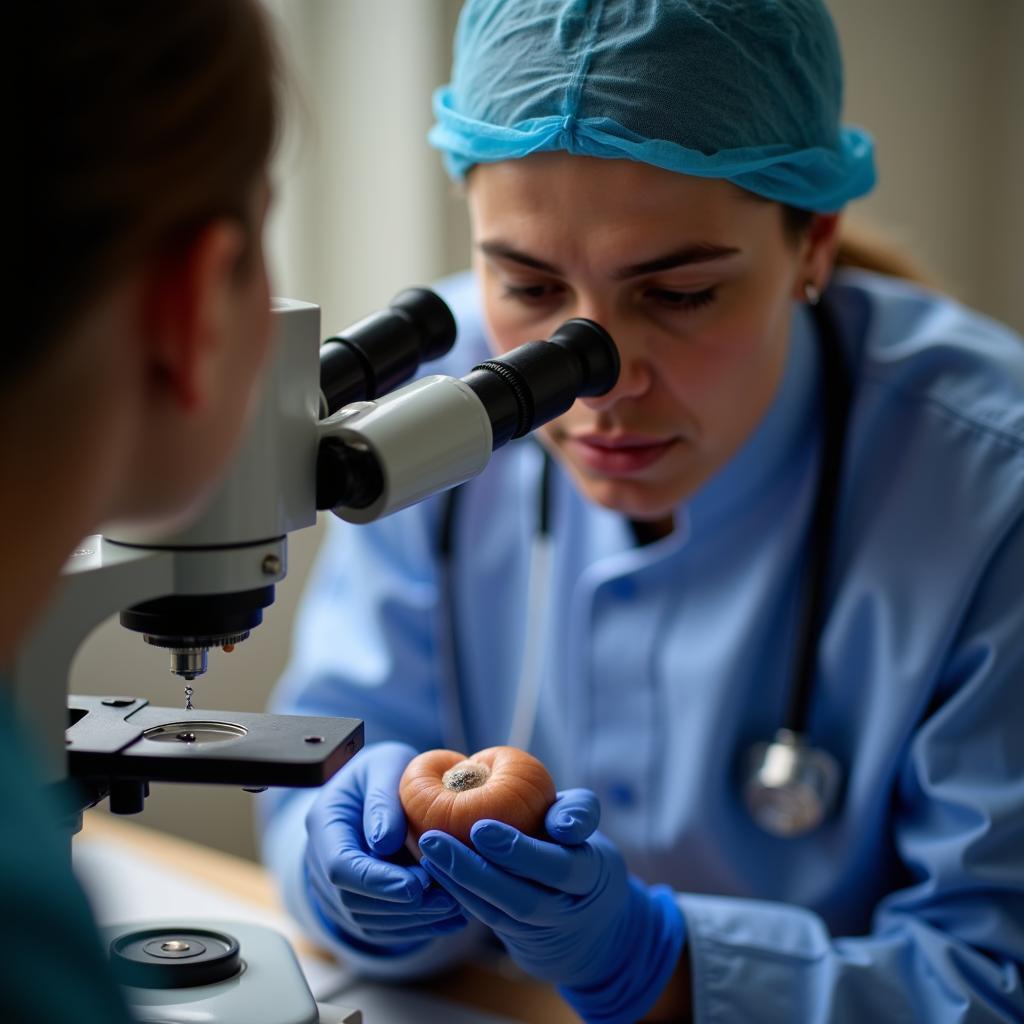Embryo Transfer In Horses is a powerful reproductive technique that allows breeders to maximize the genetic potential of their mares and stallions. It involves collecting a fertilized embryo from a donor mare and transferring it to a recipient mare, who carries the foal to term. This process offers numerous advantages, from increasing the number of offspring from a valuable mare to preserving bloodlines and managing breeding schedules. Let’s delve into the intricacies of this fascinating procedure.  Embryo Transfer Process in Horses
Embryo Transfer Process in Horses
Understanding the Embryo Transfer Process
The embryo transfer process involves several carefully orchestrated steps, starting with synchronizing the estrous cycles of both the donor and recipient mares. This ensures that the recipient mare’s uterus is in the optimal condition to receive and nurture the embryo. Hormonal treatments are often used to achieve this synchronization. Once the cycles are aligned, the donor mare is bred, either naturally or through artificial insemination. artificial breeding horses offers a controlled and efficient method for breeding. Approximately seven days after ovulation, the embryo is collected from the donor mare using a specialized catheter and sterile fluid. The recovered embryo is then carefully evaluated for quality and viability before being transferred to the recipient mare.
Selecting the Right Mares
Choosing the right donor and recipient mares is crucial for successful embryo transfer. Donor mares are selected based on their superior genetics, performance records, or other desirable traits. The recipient mare, on the other hand, should be healthy, fertile, and capable of carrying a pregnancy to term. Her genetic background is less important than her ability to provide a nurturing environment for the developing foal.
Dr. Emily Carter, DVM, a renowned equine reproductive specialist, emphasizes the importance of recipient mare selection: “The recipient mare is essentially a surrogate mother, and her health and overall condition directly impact the success of the embryo transfer.”
Benefits and Considerations of Embryo Transfer
Embryo transfer offers a range of benefits for horse breeders. It allows valuable mares to produce multiple foals per year, maximizing their reproductive potential without the physical strain of carrying and foaling themselves. This is particularly beneficial for performance mares, who can continue their competitive careers while producing offspring. appaloosa stud horses can significantly benefit from this technology. It also helps preserve the bloodlines of older mares or those with reproductive issues. However, embryo transfer is a complex and costly procedure. embryo transfer in horses cost can vary depending on several factors, including veterinary fees, medications, and the experience of the team performing the procedure.
What are the success rates of embryo transfer?
Success rates vary, but are generally around 60-80%, depending on the experience of the veterinarian and the health of the mares involved.  Healthy Mare and Foal after Embryo Transfer
Healthy Mare and Foal after Embryo Transfer
The Future of Equine Embryo Transfer
The field of equine embryo transfer is constantly evolving, with ongoing research exploring new techniques and technologies to improve success rates and efficiency. Advancements in embryo freezing and vitrification, for example, allow for greater flexibility in breeding schedules and the international transport of embryos.
Dr. Sarah Miller, PhD, a leading researcher in equine reproduction, shares her insights: “The future of embryo transfer lies in refining these technologies to make the procedure more accessible and affordable for a wider range of breeders.”
Conclusion
Embryo transfer in horses is a valuable tool for breeders seeking to optimize their breeding programs and maximize the genetic potential of their horses. While the procedure requires careful planning and investment, it offers significant benefits in terms of reproductive efficiency and genetic advancement. Understanding the intricacies of embryo transfer and working with experienced professionals are essential for achieving successful outcomes. day by day horse embryo development can be crucial in the process. chorulon for horses is another important aspect to consider.  Veterinarian Examining Horse Embryo
Veterinarian Examining Horse Embryo
FAQ
- How long does the embryo transfer process take?
- What are the potential risks associated with embryo transfer?
- Can any breed of horse undergo embryo transfer?
- How are recipient mares selected for embryo transfer?
- What is the cost of embryo transfer in horses?
- How soon after embryo transfer can I confirm pregnancy?
- What are the long-term implications of embryo transfer on the foal?
For further assistance, contact us at Phone Number: 0772127271, Email: [email protected], or visit us at QGM2+WX2, Vị Trung, Vị Thuỷ, Hậu Giang, Việt Nam. We have a 24/7 customer service team.